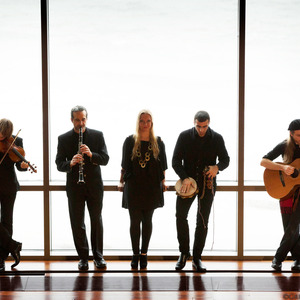

About
GUY MENDILOW ENSEMBLE
"An international tour de force” (Bethlehem Morning Call) from the Middle East, South and North America, the Guy Mendilow Ensemble operates on the notion that incredible stories and emotionally sweeping experiences can do far more than just entertain. They can spark resonance, fascination and motivation to care beyond our day-to-day. ...
Contact
The Musical Lessons of Lost Worlds: How Guy Mendilow Ensemble Engages Creatively with the Sephardic Past to Inform the Present on The Forgotten Kingdom
The past can feel distant, foreign: its communities erased, its memory buried. Yet we can sometimes access it through the fantastic, through storytelling that resonates with lived experience.
Composer and artist Guy Mendilow has followed this path to the past, weaving together vignettes, glimpses, and fragmented stories from and of Sephardic communities around the Mediterranean and Balkans. Many of these communities have been wiped off the map, even their language nearly forgotten. But the characters who sprang from them feel fresh and present, and to Mendilow, their adventures and trials suggested a Sephardic epic of sorts, complete with powerful music and universally resonant emotions and messages.
Rethinking the role of musical aesthetics and spoken word in re-creating these impressions, Mendilow and his Ensemble has recorded The Forgotten Kingdom (release: October 6, 2017). The album has two versions, one with just the music from the show, one reflecting the interwoven stories, complete with spoken interludes. Its vignettes propel listeners from old world and into new, from the mythical (“La Sirena/The Siren”), the actual (“La Vuelta del Marido/The Husband’s Return”) and concluding with the harrowing symbol of the trains to Auschwitz (“De Saloniki a Auschwitz”) that bring this older age to a definite, violent end.
“What has haunted me as I’ve created this production is how it gives us a glimpse into the end of an era, the destruction of an older world,” says Mendilow. “I wanted to explore what it was like to see the breakdown of empires, the glimmers of hope that then evaporate. What is it like to be caught on the wrong side, in that kind of nightmare? What is like to witness your world ending? How did the moment, which seems so inevitable in our historical hindsight, actually feel to those living it?”
{full story below}
The product of years of performance, research, and revising, The Forgotten Kingdom’s intertwining music and storytelling conjure an imagi-nation lost to war and upheaval, recorded in a language that blends archaic Spanish with Arabic, Turkish, Hebrew, and Greek. “As far as I know, The Forgotten Kingdom is America’s first semi-theatrical touring production made of Ladino songs from Balkan and Mediterranean communities destroyed in WWII,” says Mendilow. “It’s an evocative trek through former Ottoman lands, an allegory that ultimately begs some questions about ourselves today, and the ways these stories continue to play out, in a modern guise.” Mendilow and ensemble get the adventure to burst “with artistry, refinement, and excitement." (Hebrew Union College).
To make the work live and breathe, Mendilow learned these women's songs, traditionally sung a cappella in homes and communal celebrations, by listening to gritty field recordings. He then set aside notions of purity or authenticity, in favor of finding emotional connection. As he described his ideas to an established Ladino scholar, York University’s Judith Cohen, she laid it on the line: You either keep strictly to tradition and abide by its ways, or you pursue your own ideas, but without calling it traditional. Mendilow opted for the latter.
“That’s one of the most challenging things about the project, the moment that demanded the most soul searching,” he reflects. “The conclusion I came to was that we needed to call a fig a fig. I don’t want someone to think they’ve heard Ladino music when they’ve come to this show. It’s not about that; it’s about rendering a traditional way of life in bold, relatable colors.”
These stories speak to our age, Mendilow feels, which is why this project absorbed him for so long. “The Ladino story is a case study in resilience, in collaboration across ethnic and religious divides, and in evolving identities due to immigration,” says Mendilow. “And I feel this story begs the question: Are we also straddling an older, familiar world, and a newer one we can hardly imagine, like those in the stories did back then?” Mendilow and his fellow musicians strive to set the scene, to craft lively portraits of the characters, leaving ample space for listeners to invest in the tales, outside of the cultural and historical specifics.
Stories get better with the telling, and The Forgotten Kingdom proves no exception. Mendilow and his Ensemble, whose members play with everyone from Amanda Palmer and Snarky Puppy to Yo Yo Ma and Bobby McFerrin, started developing the live performance of The Forgotten Kingdom several years ago. The group toured the show extensively, gathering responses from audiences who had never heard of Ladino, from elders who spoke it and knew the songs from their Sephardi homes decades ago.
Mendilow felt it was time to take to the studio. The group strived to capture the energy and flow of the performance as much as possible, then dove into the texture and nuance in a way that only studio work can allow. He also expanded the project into multimedia thanks to an artist award from the NEA, tapping Ukrainian sand painters and German shadow artists to create animated versions of songs. (Two of these videos will be released around the same time as the album)
“Our goal is to sweep up audiences in an emotional experience,” says Mendilow. “We hope it’s so powerful that those with no prior knowledge or connection to Ladino will leave caring deeply about the culture and the world it creates for us. The stories are too good to be ignored, and the communities from which they come too important in terms of what they represent—from models of integration and inter-ethnic cooperation to their own rich heritage—to be dismissed.”










